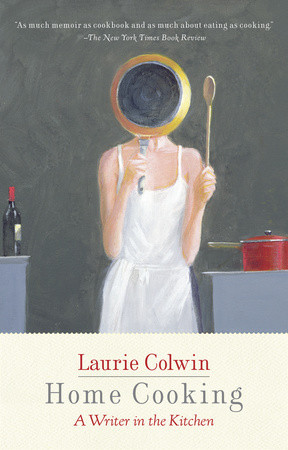In 1988, I lived near the Verrazano Bridge, and whenever the temperature was above freezing I’d walk down to the Narrows and read on one of the benches that ran along the bike path. Laurie Colwin’s HOME COOKING quickly became (and remains) one of my favorite bench reads—no surprise, considering I have loved every one of her novels. Her gift for creating authentic characters extends even to herself. At the time, I was 22 years-old and the kitchen in my New York City studio apartment was barely 3 feet wide. It didn’t have an oven or cabinets, and the refrigerator was dorm-sized (with no freezer); but this didn’t stop me from loving my little oasis, and cooking every day.
Reading HOME COOKING felt like visiting with a wise old friend. In a few chapters, Colwin shares her own experiences during her early twenties while living in a New York City shoebox apartment with a subpar kitchen. She loved and appreciated food. She was a fan of farmers’ markets, and soup. And she cooked up a storm in her crappy little place, just like me!
Laurie Colwin was a fabulous writer, and a lovely and interesting human being. She volunteered in the kitchens of homeless shelters, was a homebody, read cookbooks as if they were novels, eschewed outdoor grilling, championed English food, experimented with whatever piqued her interest, learned from her mistakes, once enjoyed lemon-flavored suet, and laughed her way through it all. She left this Earth far too soon, and was way ahead of her time in her consciousness for organic food, avoiding additives, the perils of our contaminated food supply, and touting the benefits of home-cooked fare.
Colwin’s tone is relaxed, friendly, and convincing. When she shares her kitchen disasters, you’ll reminisce fondly about your own. Even if you hate fruitcake, you’ll be enticed to bake two Caribbean Black Cakes, one to keep and one to share. Her chicken with garlic and apples from the no-salt chapter of the book is really, really good (although I do add salt). You’ll suddenly crave lentil soup, and weird eggplant concoctions. You might whip up a batch of decadent English scrambled eggs (cooked in a double-boiler) that aren’t really English at all. Or maybe you’ll try your hand at baking bread or making an old-fashioned steamed chocolate pudding.
Perhaps the most delicious thing in HOME COOKING is its sense of nostalgia, which I felt almost thirty years ago when I first read it, and still feel every time I reread it. Written during a time of grand excess in our culture, it remained grounded in sensible comfort and accessible (and affordable) nourishment, for body and soul.
HOME COOKING is about food, yes, but it’s also about taking care of ourselves and our loved ones as best we can with what we have, appreciating our myriad blessings, and remembering to laugh while we move through this crazy, unpredictable world. It’s the perfect recipe for a delicious life.








